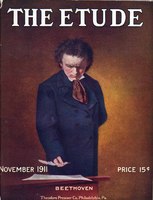BY FREDERICK KITCHENER.
That the organ is the “king of instruments” is an assertion which the average music-lover accepts without question. If this assertion was true when first made, many years ago (the organ at that time being a comparatively clumsy and unmanageable instrument, to play upon which involved no small amount of sheer animal strength and physical endurance) how much more true it is in these days of orchestral stops, pneumatic action, and labor-saving contrivances! Given the most perfect of stops, no player could possibly give much pleasure to his hearers while the actual effort of performance caused him great discomfort, if not positive pain. What a vast amount of mental energy is expended by enthusiastic protagonists upon the question of the improvement of the modern organ! That a considerable number of persons, competent, no doubt, and thoroughly understanding the subject argued upon, should differ greatly in their individual ideas concerning what does and what does not constitute a genuine innovatory improvement in organ construction, is in itself a healthy sign of the importance generally attached to the matter. While allowing for and admiring the high pitch of excellence in organ-building already attained to, those of us who are young may confidently expect that changes, no less far-reaching and wonderful than those contemplated or carried into execution during the last few years in other branches of human activity, will take place in both the mechanical and artistic designs of the organ of the future.
Every musician knows what an immense advance in the style of pianoforte composition was caused by the extension of the keyboard of the instrument. It is no exaggeration to say that a revolution in Beethoven’s pianoforte conceptions was largely the result of the greatly increased opportunities of self-expression which this mechanical extension afforded him. Comparing the pianoforte with the organ, no one will deny that the improvements made in the construction of the former during Beethoven’s lifetime were relatively of infinitely less significance than those which have been made in the construction of the latter during the last fifty years. It cannot be maintained, however, that a corresponding advance in the style of composition for the organ has been made. Max Reger is thought by many to be the leading composer of organ music now living. It is said that “Back to Bach” is his musical motto; but the idea of such retrogression is paradoxical, as a mere glance at Reger’s works shows us that he has written many progressions that Bach never would have written, in spite of the unfounded and easily disproved assertion of some that Bach forestalled everything possible of accomplishment in modern music. Again, in composing many of his works, Reger seems to have ignored the possibilities of modern registration and the registrative powers of present-day organists. It may be argued on his behalf that Bach did the same; but we must remember that the organ for which Bach wrote was very different from the complex, subtle and expressive organ representative of to-day. In many modern German works for the organ, not only of Reger, but also of other composers, it seems that the music was first composed without any thought whatever of the registration; that the piece was then gone through and a few directions for manual- change thrown in haphazard. Indeed, the manuals are often directed to be changed in places where changes prove to be totally ineffective in actual performance; or the directions “crescendo” or “diminuendo” are given in passages where it would be impossible for these effects to be obtained, the hands and feet being fully occupied in playing the written notes. Passages obviously intended for performance upon one manual are also, as an afterthought, divided and given to two manuals, the result being awkward and ineffective.—From the London Musical Times.



